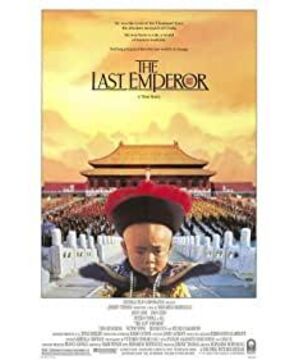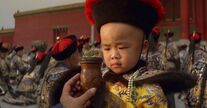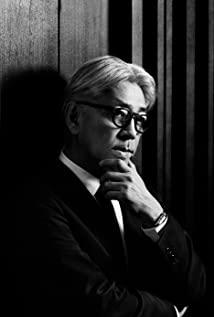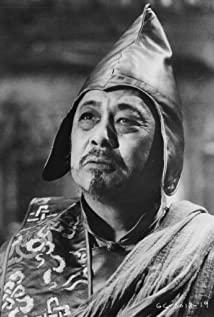In the movie, Wenxiu says "I want a divorce" three times . Wenxiu's decision to make this decision was not an impulsive move. The "last straw that broke the camel's back" in the film is the sweet and tacit cooperation between Wanrong and Puyi in the Country Club.
After Puyi finished singing in the Xiangyi Club, he walked straight to Wanrong's side, kissed Wanrong, and pulled Wanrong to invite her to dance on the dance floor, without paying any attention to Wenxiu. Wen Xiu, who was beside him, lowered his head silently. Along with the lighthearted dance music in this plot, the camera cuts to Wenxiu's profile, highlighting her empty and hopeless eyes. When dancing with an American young man, Wenxiu's eyes could not help but focus on Puyi and Wanrong. The two danced enthusiastically, looking forward to the western world they longed for.
After the entertainment of the Xiangyi Club was over, Wenxiu, Wanrong and Puyi got into the car and returned to their residence together. It was in this car that Wenxiu made three requests for divorce. After Puyi asked Wenxiu if she needed chewing gum, Wenxiu stared straight out of the car window and said "I want a divorce." A gibberish, did not take Wenxiu's words to heart, and continued to read the newspaper.
After confessing her "superfluousness" to Puyi, Wenxiu said "I want a divorce." for the second time. At this time, Pu Yi lowered his voice and replied angrily: "No one can divorce me!".
After Puyi got out of the car, Wenxiu sat in the car and shouted at Puyi who walked into the door: "I want a divorce!". After Pu Yi heard this, he paused for three seconds in front of the door.
The next scene pushed the incident of Wenxiu's divorce to a climax. Sakamoto Ryuichi's composition "Rain (I want a divorce)" ("Rain (I want a divorce)") sounded along with Wenxiu's pace of running out of the mansion. Every string of the violin in the soundtrack affects the hearts of moviegoers, and every time the violin plays in unison, Wenxiu is one step closer to being free. Along with this orchestral performance, Wenxiu ran into the rain with an excited look on her face. She said "I do not need it!" twice in a row, threw down the umbrella that Xiao Lizi had brought over, and then left the feudal royal marriage she hated and embarked on a path to pursue freedom.
The director's shrewdness lies in the fact that, based on the original facts, he used tight shots and repeated lines with different emotions to show Wenxiu's determination to break through feudal shackles and seek freedom. The image of a brave woman who embraces new ideas in the transition from one generation to the next.
Of course Wenxiu knew that a divorce from the emperor would require a considerable price. Without clothes and food, if you have to make a living on your own, you will be spurned by the Qing Dynasty survivors, and even bear the mental pressure from your own family. And Wenxiu did not give up the idea of divorce because of this. In Puyi's own words, this required "double courageous behavior".
The three "I want a divorce" have three completely different emotions, and I personally think that Puyi's attitude towards this request has also changed. Wenxiu made a plain statement at the beginning, to the grievances after pouring out the bitter water, and then to the emotional shouting, her appeal became stronger and stronger each time, and her determination was also in the "I want a divorce" three times before and after. gradually firm. And Puyi's change in attitude also helped push the film forward. The inattentiveness at the beginning was reasonable: in the centuries that the Aisin Gioro family ruled China, no imperial concubine ever proposed to divorce the emperor, and Puyi naturally thought that Wenxiu was playing a nonsense joke. The second time he heard this appeal, Puyi was angry. He believed that his emperor's prestige was being despised, and the rules of the royal family for hundreds of years were also violated. And the last time, Puyi's attitude played a role in fueling the development of the film. The director used Puyi's still back to convey Puyi's acquiescence to Wenxiu's divorce, expressing Puyi's shock and helplessness, and making it reasonable that Chen Baochen and others did not step forward to stop the plot arrangement when Wenxiu ran out of the mansion. Although in history, Wenxiu's divorce has gone through the complicated process of suing Puyi, reconciling with Puyi and signing a divorce agreement, but the director used just a few minutes of footage to show such a historical event reasonably and with great skill. The plot of Wenxiu's divorce gradually reached its climax under the background of the soundtrack "Rain (I want a divorce)" by Ryuichi Sakamoto. The wonderful soundtrack shows Wenxiu's expectation and excitement towards freedom, and it also makes the listeners feel a surge of emotions, as if an emotion is about to burst out. Such magical and charming music gave Wenxiu a new lease of life, and also symbolized a challenge to the old feudalism by new ideas.
View more about The Last Emperor reviews











